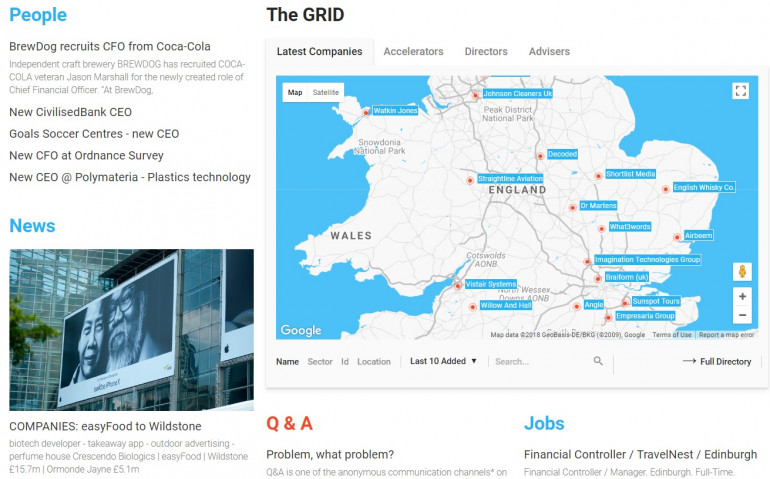Published by Ronan Bryan on May 23, 2019, 10:09 am in Promotion, Blog post

Listening to Dominic O’Connell (DO’C), business presenter of the Radio 4 Today programme at breakfast time one day last week, I heard the ‘S’ word and stopped crunching my toast so that I could tune in better.
‘ScaleUps’ is not an elegant word, but is a pretty recent addition to the baffling lexicon of growth business labels: SMEs, Gazelles, HGFs, Unicorns and GRID companies (definitions at the end of this article).
DO’C was interviewing Liz Stevenson (LS), Head of Government Relations, Tech Nation about the freshly-published Tech Nation Report 2019:
LS: The Tech Nation Report is a really strong investment story, we’re seeing 2.5 times investment in tech ScaleUps compared to the size of our economy and that puts us 4th behind giants such as the US, China and India.
DOC: What’s a ScaleUp? All the way through this report there are words that I don’t understand.
LS: These are the fastest growing companies in the UK, growing year on year high revenue rates of over 100%
DOC: Yeah but do they have to be a certain size …a certain growth rate? There’s no numbers at all…
LS: It’s a fascinating sector thank you. The UK has over 6,000 technology scaleup companies that are those that are really, really bucking the trend …that there’s this mentality that the UK can create startups, but we can’t grow our business quickly. And this report highlights that the UK techs scaleup sector is where investment needs to be directed and across the UK, not just in London
DO’C dampened the party mood a little bit by pointing out that the UK is bottom of the Tech Nation chart of 18 nations and 2 groupings (OECD and EU 28) with ‘domestic R&D; expenditure as a percentage of GDP’ at under 2 per cent. Also that the CBI had forecasted a mere 0.02% yearly improvement of this figure for the UK.
LS responded by saying that Tech Nation saw leadership, mentoring and innovation as ways of tackling this problem.
After a couple more minutes of the brief interview - and more words like investability, AI, cyber, bright spot, global priority, programmes and clusters - had flashed past, we the listeners weren’t a great deal wiser. But, hopefully we had the feeling that there’s something called technology and that the UK is very good at it. Especially in Fintech.
Seeking more enlightenment, I downloaded the report that had been worked on by 26 Tech Nation team members. Although I understood all the words (as I’m sure DO’C – ex-Business Editor of the Sunday Times - did as well), I found the wonkish word salad and breathless approach a real struggle: lots of statistics, jargon, clichés and marginally interesting charts regurgitating research from, amongst others:
- Street Bees - ‘Consumer perceptions in Tech’
- Github - ‘Cross border developer collaboration underpins innovation’
- Meetup.com - ‘Tech meetup interests vary across the globe’
If you would like to read this report, you will be invited to 'book a deep dive into tech' and learn that 'tech nations have unique tech scaleup DNA profiles. Emerging technologies …are becoming new ecosystem drivers'.
That’s so cool!
NOTES & LINKS:
- Definitions:
- ScaleUps - The ScaleUp Institute: 'companies who have increased their turnover and/or employee numbers annually by more than 20 per cent over a three-year period'.
- SMEs - Wikipedia: 'Small and medium-sized enterprises. In the UK, a company is defined as being an SME if it meets two out of three criteria: it has a turnover of less than £25m, it has fewer than 250 employees, it has gross assets of less than £12.5m. Many small and medium-sized businesses form part of the UK's currently growing Mittelstand, or Brittelstand as it is also often named.' NB The Department for Business, Energy & Industrial Strategy (BEIS) describes 99.3% of the 5.7 million UK private sector businesses registered at the start of 2018 as SMEs - obviously a much broader definition.
- Gazelles - Investopedia: 'a high-growth company that has been increasing its revenues by at least 20% annually for four years or more, starting from a revenue base of at least $100,000';
- HGFs - Nesta: 'High-Growth Firms. OECD definition of high-growth, which is a firm of 10 or more employees that grows either its staff or turnover by an average of more than 20 per cent per year for three consecutive years';
- Unicorns - Wikipedia: 'privately held startup companies valued at over $1 billion';
- GRID - Directorzone: 'dynamic companies with strong GRowth, Innovation and Direction'. Yes, we are attempting to muscle into the market for acronyms, but trying to minimise gobbledygook and cliches.
- BBC Radio 4 Today programme: “Insight, analysis and expert debate as key policy makers are challenged on the latest news stories.”
- Tech Nation: “We help startups connect, learn and scale through growth programmes and initiatives. Formerly Tech City UK & Tech North.”
- Tech Nation Report 2019
- The ScaleUp Institute “Scaleup ...Nationally, the latest 2017 data from ONS shows that there are 36,510 of these businesses. … a 3.7% increase over the previous year … means that the economy added 1,300 companies going through a period of rapid growth. There are 35% more scaleups than in 2013, compared to GDP growth over the same period of just 9%. Scaleups generate more than £1.3trn in combined turnover. This is up 34% on 2016, and compares to a turnover of £1.9trn by all SMEs combined. They employ approximately 3.4m people across all sectors and areas of the UK economy.”








